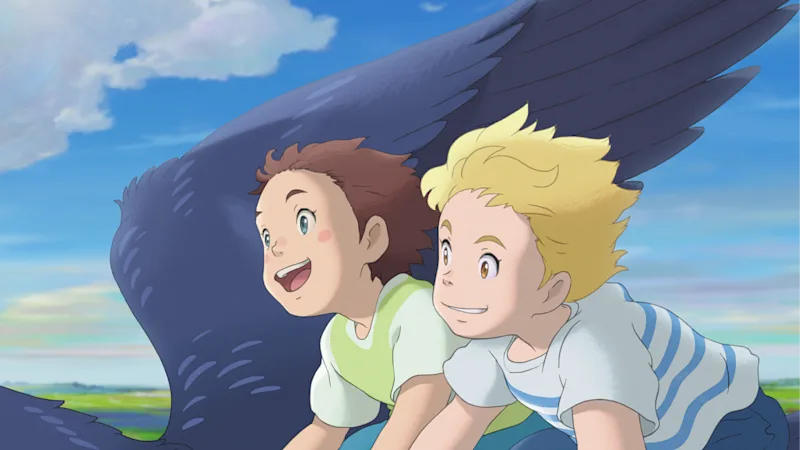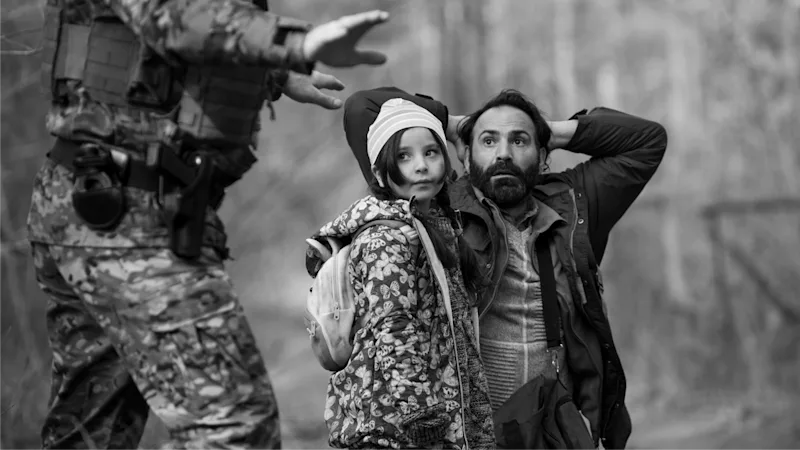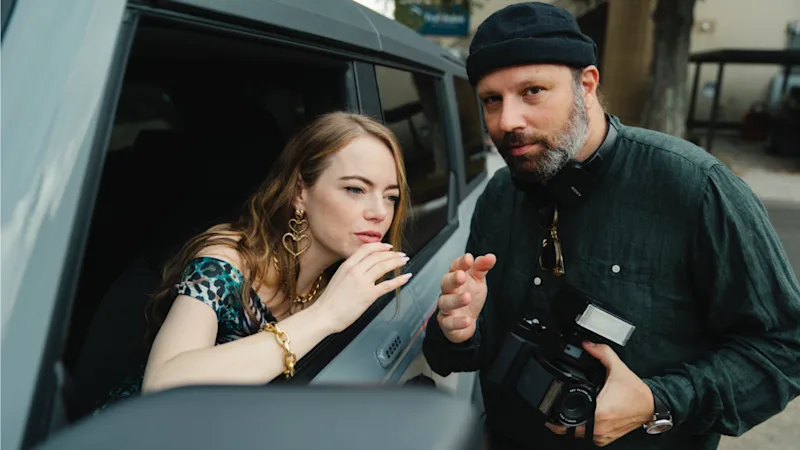
The 2023 Hollywood Climate Summit, the annual multi-day conference focused on climate change and featuring a variety of entertainment and media personalities, was held on June 21-24 at the Samuel Goldwyn Theater in Beverly Hills, California.
This year, the opening keynote panel, "We're All In: Why You Should Be Excited About the Hollywood Climate Movement," sponsored by YEA! Impact, featured Oscar-winning Everything Everywhere All at Once writer-directors Daniel Kwan and Daniel Scheinert and an opening statement by the film's Oscar-winning producer, Jonathan Wang. The panel, which was led by Emellie O'Brien (CEO of Earth Angel) and also included Quinta Brunson, focused on climate innovations and justice advancements in Hollywood, as well as how professionals in every role in Hollywood have the power to influence sustainable practices, shift perspectives, and inspire others to fight for the environment.
Jane Fonda led the panel "Hollywood’s Time to Take on Big Oil+Gas," sponsored by Fossil Free Media. During the panel, Fonda focused on SB 1137, a crucial California bill on the ballot in 2024 which would prohibit new oil and gas wells within 3,200 feet of homes, schools, nursing homes, and hospitals. Furthermore, it would require companies to adopt health, safety, and environmental requirements. Fonda was joined by climate activists Nalleli Cobo, YoNasDa Lonewolf, and Sylvia Arredondo, as well as environmental reporter Emily Atkin.
"I don't think that people realize that this crisis is upon us," Fonda told A.frame. "This isn't my grandchildren in the future kind of a thing. This is right now. We have a few years left [before] we can avoid a real catastrophe."

A.frame spoke with Kwan, Scheinert, Wang, and Fonda backstage at the summit, where they talked about different ways to help with climate change on film sets and why it's now more important than ever to be all in.
A.frame: What is Hollywood missing about climate change right now?
JANE FONDA: I don't think that Hollywood realizes the urgency of this. I don't know if they realize that climate scientists are unanimous in telling us this is code red, this is serious, and it's upon us right now. Since fossil fuels, oil and gas and coal are the primary culprit, first of all, studios have to stop investing in those things. They have to talk to their banks and they have to, like a lot of other very big businesses that are responsible, withdraw investments in fossil fuels. That's one thing. The second thing is studio vehicles should be electric. They should try to electrify as much of their infrastructure as they can, do away with single use plastics, catering should be sustainable. No plastics covering the food or holding the food. Things like that.
Why are movies and art important in the conversation about the climate crisis?
FONDA: Storytelling is absolutely critical, and movies are very well-suited to telling stories. Regarding the climate novels, it's harder because the climate crisis is a visual issue; it's more suited to movies than novels. Artists, painters, sculptors, poets. Art has to be part of the solution because art can reach people where words, rhetoric doesn't reach them. It can bypass censors. It can show us that the way we think things have to be doesn't isn't necessarily the way things have to be. So, it's very important. That's exciting that a director like Adam McKay is so focused on the climate crisis and is preparing a movie about it. Of course, he's already done Don't Look Up, and he's started a project called Yellow Dot to give people things they can use too on social media.
Is there anything holding studios and productions back from investing in sustainable practices?
FONDA: It's just a question of will. You know, the world has the technology, we have the knowledge. We have everything we need to meet this crisis, except the will, the political will. I guess you can call it political will. Hollywood just has to do it. There's no real barriers. I mean, everything is hard. Living is hard. I think every single production can do it. They just have to do it. And, during this time when there are no productions because of the strike, producers and administrators should be putting their thinking caps on and figuring out how to do it. They've got some downtime now to figure it out, and there's plenty of people that they can go to help them do it.

Where can people start thinking about making their sets greener?
DANIEL KWAN: Start small. I think we are working against the inertia of this massive system that has been basically unchanged for a very long time. So, start small and start where you see the path of least resistance, the things that you are most passionate about, the places that your crew is already directed towards. The interesting thing about this next generation is people want to have this conversation. And even just giving them the opportunity to talk about it will open up so many doors, and you will learn so much through just that process. You don't have to have all the answers. You just have to open up a space for the conversation as people who are in charge of the set or people who have to manage other people. That is the bare minimum, and it is not a hard thing to do.
JONATHAN WANG: I don't want [there to be] any hindrances. Instead, I feel like there's this real longing to check our consumption, check the way that we are interacting with the planet, and really have a whole systems view of the way that we exist, the way we make movies. And the more people can think that way, I think the better our chances of actually reversing climate change, and being able to stay within our planetary boundaries. That, to me, is the most exciting thing of all.
What are some unexpected ways to make sustainable changes on set?
WANG: We didn't have trailers on set. We had a location where actors could just come into a building rather than having everyone out at a trailer. And it's even just shifting the way we see how we're running sets. If you're thinking profit first, so let's get rid of the trailers so we can make more money. Well, then you've just kind of swapped one problem for the other. But if you're thinking, 'Well, let's get rid of the trailers, not for just pure profit reasons, but actually for the planet,' then it kind of sets a whole tone and ethos on set where the priority is the sustainability, and the well-being of all, the psyche of all, the health and wellness of everyone on set.
DANIEL SCHEINERT: I love carpooling… when we shot in L.A., we lived close to a bunch of our crew. And then, when we've shot at other places, we all live in a hotel, and then the carpool becomes work too. It's like such a valuable team building, but also a pre-pro meeting. And so, we just got like five cars off the road, and we get to travel with our AD, our production designer, our assistant, our producer…
KWAN: We just blast the same songs every day. It's a morale thing. A bonding thing. Also, you get more work done.
SCHEINERT: I love living near where we're shooting, and trying to buy as much locally as possible, and like avoid big box stores, etc. Because, even if it costs a little bit more, the carbon footprint of shipping things from Target and Walmart is just insane.
KWAN: One of the weird things that is kind of tough to talk about because it infringes on, you know, creative freedom is don't do as many night shoots… especially exterior night shoots where everything is being run on generators. People talk about water bottles and they talk about other things. But, you know, our generators and our transportation, that takes a massive chunk of the pie of our carbon footprint as an industry. So, can you rewrite night shoots? Can you shoot night shoots in studio where you can do it during the day? Can you do splits instead of full night shoots? Because not only are you going to be better for the environment, it's better for your crew's health and morale. Like night shoots are brutal.
SCHEINERT: We did a week of night shoots on assignment and it was the lowest low we ever hit while filming.
KWAN: After that, we were like, we are going to do our best to write rewrites, rearrange our productions so that we are limiting the amount of time our crew members are, you know, nocturnal. You lead to more, at least much more accidents. People driving home are no longer safe. So, when you find these win-wins where everything kind of gets better. And also, like I said, sometimes limitations really open up to creativity. And actually really open up the possibilities of what your story could be. And you just weren't thinking about it that way until you saw the limitation. So, that's one really simple way; like less night shoots.

How is diversity and inclusion part of the climate conversation?
KWAN: It's all connected. You cannot talk about climate without talking about diversity, and community, and labor. Everything is connected in a way that I think makes it really hard for you to not engage with climate. When you look at it through that lens, you say, 'Oh, every person here is engaged, is living through the same disaster as I am. Every tree is trying to survive this thing.' And, when you start looking, when you start opening up your perspective of what it means to be a climate activist, you realize really it is just to be a human who realizes their place in the world and how it's all connected. The community is a huge part of that… and that's also one of the easiest ways to engage, because sometimes when you get too big and start being too global, you get overwhelmed. I engage with the community... that is a really great, safe place to start.
How can filmmakers think about incorporating sustainability into their productions?
KWAN: There are a lot of communities and organizations within the industry already doing the hard work. You don't have to start from scratch. Go to those people, empower them, and learn from them, and ride that wave with them.
SCHEINERT: Part of the reason we're here is because we had a meeting with Emellie at Earth Angel last year and, as we talked with her, we kind of went department by department and heard how much they've been thinking and working to find solutions to empower every single corner of a film set to be greener. And we were just like, 'Holy cow, there's this resource. It's just been sitting here. We didn't know about it.' So, that organization was a big part of like looping us in here.
How does self-care play a role in climate activism?
SCHEINERT: We heard a climate writer one time say on the podcast that he doesn't read anything climate related past 5 p.m. It's important to take care of yourself because, if you can stay engaged for longer, that's way more important than like, 'Did you stay up till midnight worrying about [it]?'
KWAN: You are a part of the environment in your power to really save the environment, and you have to save yourself too. And I think that's a big part of it too. There's a reason why, on airplanes, they always say, 'Put the mask on yourself before you help others.' That is it. It is not selfish. And we have to reframe it as self-care is caring for the planet.
Answers and comments have been edited for length and clarity.
Reporting by Erica Bardin
RELATED CONTENT:
Summer Movie Preview: Your Guide to 2023's Most-Anticipated Movies
The Inside Story of How 'Avatar: The Way of Water' Became One of the Greenest Sets Ever (Exclusive)
Earth Day 2023: Documentaries to Stream






